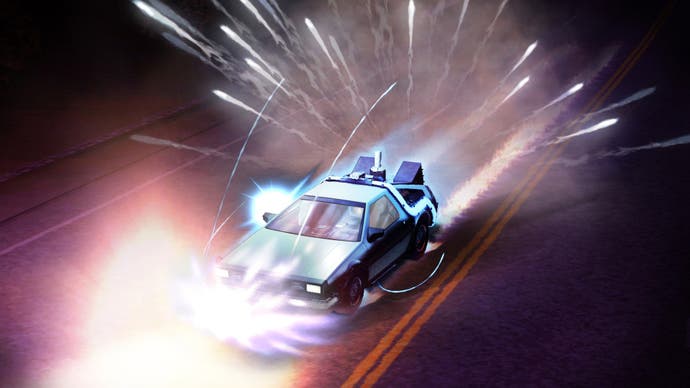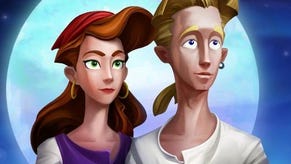Back to the Future Episode 1: It's About Time
You are my density.
Biff still says things like "Lookee what we have here" and boasts an obvious blond wig, while the freakishly good Michael J. Fox vocal impersonator is wedded to some truly brilliant animation touches which capture every nuance of Marty McFly, right down to that particular way he rubs the back of his neck when stressed. Christopher Lloyd is on hand as the Doc in a typically wonderful turn, while Bob Gale, one of the series' co-creators, makes a very welcome addition as story consultant. (Pointless trivia: Gale also had a stint writing Batman comics.)
The world of Hill Valley, meanwhile, is filled with familiar sound effects – if you don't get a chill when the time circuits first bleep to life, you are a hollow shell of a human being – and neat little details. A to-do list tucked into one of the Doc's notebooks includes a reminder to pick up a bullet-proof vest; a sign announces the law offices of Gale, Zemeckis, and Fine; and the framed black-and-white clock tower snap sits in Marty's bedroom alongside Miami Vice and Weird Science posters.
Doc's famously unpredictable giant amp features in an early puzzle, and while the adventure soon heads for an entirely new time period – it doesn't seem fair to say which one and spoil your first play-through – it feels like a very natural choice: another era in Hill Valley's cyclical history in which a generation of Tannens are booting a generation of McFlys around, and the Jones family is still in the manure business.

As an adventure game, however, it's a solid effort rather than a dazzling one. It's a pacey riff on (what else?) the Three Trials, with a strong focus on story and dialogue and just enough room at the end for a blast of action and a tease for the next instalment. There are a fair few hints suggesting that the game was slightly rushed – movement is inelegantly handled, the game's environments grow increasingly non-interactive the further you get into the story, and one puzzle mechanic is used twice with little in the way of variation – but the scenarios zip past in a pleasant blur, and there's a gentle humour that gives life to even the slowest moments.
If you had any hopes for the time travel theme bringing with it a Day of the Tentacle-style causal complexity, however, you're going to be disappointed. The teaser for the next episode hints that a touch of temporal intricacy is on the way, but for now, the developer is playing it safe, using the Flux Capacitor as a way of opening up new environments rather than allowing the flow of time to tangle itself up with the puzzle mechanics. The film series had the fleet-footed audacity to fold up crucial parts of a sequel and stuff it back inside the timeline of the first movie; it would be nice to see Telltale engaging in the same kind of tricks at some point.
Ultimately, It's About Time is a decent enough adventure game in a wonderfully-realised universe, where a little bit of corner-cutting can't ruin the pleasures of all the unlikely elements the developer gets right.
Having never given a toss about things like Star Wars, I was largely unaware of the power of videogames combined with the right license. But the swell of Alan Silvestri's score with the firing up of time circuits and the rev of the DeLorean's engine caught me unawares and genuinely made me feel like I was seven again: seven and filled with dreams that I too could listen to Huey Lewis and the News tapes on my Walkman and tit around on a skateboard. An authentic tribute.


